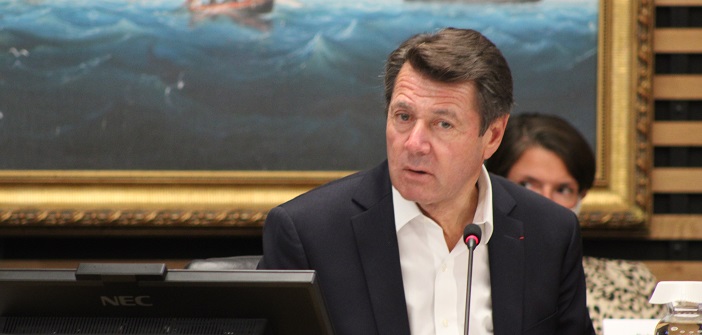Distancing is not only sanitary, it is also social and, like the former, it can only be beneficial: this is the case with the Nice municipal council meetings which, when held remotely, lose their antagonistic, often aggressive, sometimes venomous character.
In this setup, the Mayor, having no one in front of him, can avoid, as much as possible, his long winded speeches, the opposition’s sparring matches, and the deputy mayors’ performances aimed at showing off. The debates regain a certain fluidity. Yesterday, Christian Estrosi set the tone by abandoning his dual role of leader and baritone to become a conductor, setting the pace and tone, and making the orchestra and soloists play together.
The ensemble is in good form: lots of courteous exchanges among colleagues and self-congratulation. Despite the challenging time, the morale is high. And that’s a good thing. Since the approval of the deliberations is assured by an overwhelming majority, everyone might as well express their ideas in a calm atmosphere, which, ultimately, is not too bad.
The session began with an update on the vaccination strategy, “a success” according to the Mayor of Nice, who praised the good organization and results: nearly 80,000 residents of Nice and the metropolitan area have received at least the first dose (12% of the population compared to 8% nationally, he said).
This satisfaction was not well-received by Philippe Vardon (RN), who accused (not for the first time) Christian Estrosi of being linked to Emmanuel Macron’s crisis management (which he obviously considers catastrophic). The accusation was brushed aside by the Mayor of Nice, who described himself as “a mere regional administrator.” In this game of deception, if humility does not suit Christian Estrosi, it must also be acknowledged that Philippe Vardon is already campaigning for the regional elections (for him, Estrosi = Muselier) and has his sights set on the presidential elections in 2022.
The main dish of the day was the 2021 preliminary budget, the main lines of which had already been presented during the budget orientation debate.
Presented by chief financial officer Philippe Pradal, the figures support the overall strategy outlined for the mandate. They revolve around expenditures to address the health crisis, support for sectors heavily affected by it (heritage, culture [€10.8 million], sports, associations), economic recovery (infrastructure [Third Places at 109, Opera House, Victorine, former Church of Saint Francis]) and the ambitious ecological transition plan (CTRE). Operating costs remain stable (€561 million), investments rise to €90 million, debt (€441 million) is under control and benefits from particularly favorable interest rates (less than 2%). Significant aid will also come from the National Recovery Plan (€2.8 billion for the Metropole), 1/3 of the investment expenditure being eligible for funding.
A piece of good news in these gloomy times: no increase in taxes (an electoral campaign promise). Property tax remains unchanged, at a rate (29.62%) among the lowest compared to other cities of the same size. All this was not enough for the opposition who, quite naturally, voted against: “We are voting against the preliminary budget, which is a holey basket in these times of crisis,” commented ecologist Juliette Chesnel.
The Municipal Council also approved the initiation of the public consultation procedure regarding the extension of the Promenade du Paillon, on the section between Traverse de la Bourgada and the north of the Palais des Expositions. As planned, the building currently housing the TNN will be demolished.
Reminder: The implementation of this project will allow for the conversion of the Palais des Expositions into the Palais des Arts et Spectacles with the creation of an 800-seat theater, a 1200-seat auditorium, and a space dedicated to the Carnival museum.
This entire project was once again heavily criticized by Jean Moucheboeuf (RN) for the consequences that, in his opinion, it will have on local businesses that benefit from it.
Another important or at least sensitive point was the presentation by the First Deputy Anthony Borre, who is also President of NCA Habitat, of a partnership agreement between the Prefecture, the Public Prosecutor, and the lessor aimed at enhancing the security and tranquility of social housing residents and facilitating evictions. A “commendable” measure according to ecologist Juliette Chesnel but which she classifies as publicity operations.
This provided Christian Estrosi with the opportunity to revisit his security policy (partnership between national police and municipal police, deployment of cameras and call terminals). Relying on surveys, he claimed they have 64% and 79% positive feedback, respectively. According to him, Nice should be a candidate city for the experiments envisioned by the global security law after its approval by Parliament. In this context, he wants to revisit his facial recognition project for people on watch lists.
Philippe Vardon (RN), always sensitive to this issue which he has made his forte, took the opportunity to remind Christian Estrosi of his campaign commitments in… 2007.


